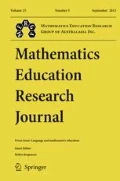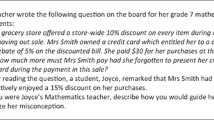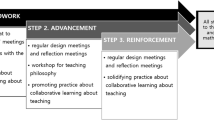Abstract
In order to promote mathematical understanding among English Language Learners (ELLs), it is necessary to modify instructional strategies to effectively communicate mathematical content. This paper discusses the instructional strategies used by four pre-service teachers to teach mathematics to secondary students in English-medium schools in Arusha, Tanzania as a result of the tensions they faced and reflections on their teaching. Strategies such as code switching, attending to sentence structure, non-linguistic representations, and placing the content within a familiar context proved to be beneficial strategies for conveying mathematical ideas.


Similar content being viewed by others
References
Bailey, J., & Taylor, M. (2010). Conceptions, language, culture and mathematics and the New Zealand curriculum. Waikato Journal of Education, 15(3), 131–140.
Brock-Utne, B. (2003). The language question in Africa in the light of globalization. International Journal of Peace, 8(2), 67–87.
Brooks, J., & Brooks, M. (1999). In search of understanding: The case for constructivist classrooms. Alexandria: Association of Supervision of Curriculum.
Denzin, N. (2006). Sociological methods: A sourcebook. Piscataway: Transactions Publishers Paperback.
Engeström, Y. (1999). Activity theory and individual and social transformation. In Y. Engeström, R. Miettinen, & R. Punamäki (Eds.), Perspectives on activity theory (pp. 19–38). New York: Cambridge University Press.
Greeno, J. G., Collins, A. M., & Resnick, L. B. (1996). Cognition and learning. In D. Berliner & R. Calfee (Eds.), Handbook of educational psychology (pp. 15–46). New York: Macmillan.
Hiebert, J., Morris, A., & Glass, B. (2003). Learning to learn to teach: an “experiment” model for teaching and teacher preparation in mathematics. Journal of Mathematics Teacher Education, 6, 201–222.
Johnson, K. (1992). Learning to teach: instructional actions and decisions of preservice ESL teachers. TESOL Quarterly, 26(3), 507–535.
Kohler, F. W., Henning, J. E., & Usma-Wilches, J. (2008). Preparing preservice teachers to make instructional decisions: an examination of teacher work samples. Teaching and Teacher Education, 24(8), 2108–2117.
Krashen, S. D. (1985). The input hypothesis. London: Longman.
Lincoln, Y. S., & Guba, E. G. (2000). Paradigmatic controversies, contradictions and emerging confluences. In N. K. Denzin & Y. S. Lincoln (Eds.), Handbook of Qualitative Research (2nd ed., pp. 163–188). Thousand Oaks, CA: Sage Publications, Inc.
Lucas, T., & Katz, A. (1994). Reframing the debate: The role of native language in English-only programs for language minority students. TESOL Quarterly, 28(3).
McIntyre, D. J., Byrd, D. M., & Foxx, S. M. (1996). Field laboratory experiences. In J. P. Sikula, T. J. Buttery, & E. Guyton (Eds.), Handbook of research on teacher education (2nd ed., pp. 171–193). New York: Macmillan Library Reference.
McNeill, D. (1992). Hand and mind. What gestures reveal about thought. Chicago: The University of Chicago Press.
Mewborn, D. S. (2000). Learning to teach elementary mathematics: ecological elements of a field experience. Journal of Mathematics Teacher Education, 3(1), 27–46.
Meyers, E. (2007). From activity to learning: using Cultural-Historical activity theory to model school library programmes and practices. Information Research, 12(3).
Ministry of Education and Culture. (1995). Education and training policy. http://www.tzonline.org/pdf/Educationandtrainingpolicy01.pdf
Moore. (1995). The craft of teaching. MAA Focus 15(2), 5–8.
Nation, I. S. P., & Webb, S. (2011). Content-based instruction and vocabulary learning. In E. Hinkel (Ed.), Handbook of research in second language teaching and learning (pp. 631–644). New York: Routledge.
Okonkwo, C. (1983). Bilingualism in education: the Nigerian experience re-examined. Prospects, 13(3), 373–379.
Osaki, K. M. (1991). Factors influencing the use of the environment in science teaching. Ph.D. thesis, University of Alberta.
Paltridge, B., & Starfield, S. (2011). Research in English for specific purposes. In E. Hinkel (Ed.), Handbook of research in second language teaching and learning (pp. 106–121). New York: Routledge.
Perso, T. (2003). School mathematics and its impact on cultural diversity. Australian Mathematics Teacher, 59(2), 10–16.
Puja, G. (2001). Moving against the grain: The experiences of Tanzanian female undergraduates. Ph.D. thesis, Department of Sociology and Equity. Ontario Institute for Studies in Education, University of Toronto.
Qorro, M. (2006). Does language of instruction affect quality of education? HakiElimu Working Papers, 06(8).
Richardson, V. (1996). The role of attitudes and beliefs in learning to teach. In J. Sikula, T. Buttery, & E. Guyton (Eds.), Handbook of research on teacher education (2nd ed., pp. 102–119). New York: Macmillan Library Reference.
Samoff, J. (2002). Local initiatives and national policies: the politics of private schooling in Tanzania. International Journal of Educational Research, 15(5), 337–391.
Shein, P. (2012). Seeing with two eyes: a teacher’s use of gestures in revoicing to engage English language learners in the repair of mathematical errors. Journal for Research in Mathematics Education, 43(2), 182–221.
Smalley & Retallick. (2011). Purposes, activities, and documentation of early field experiences in agricultural education: A national Delphi study. Journal of Agricultural Education. 52(3), 100–109.
Spradley, J. P. (1980). Participant Observation. New York: Holt. Rinehart and Winston.
Stillman, J., & Anderson, L. (2011). To follow, reject, or flip the script: managing instructional tension in an era of high-stakes accountability. Language Arts., 89(1), 22–37.
Walshaw, M., & Anthony, G. (2008). The role of pedagogy in classroom discourse: a review of recent research into mathematics. Review of Educational Research, 78(3), 516–551.
Warren, E., Young, J., & deVries, E. (2007). Australian indigenous students: The role of oral language and representations in the negotiation of mathematical understanding. In J. Watson & K. Beswick (Eds.), Proceedings of the 30th annual conference of the Mathematics Education Research Group of Australasia. MERGA.
Wenger, E. (1998). Communities of practice: Learning, meaning, and identity. New York: Cambridge University Press.
Zevenbergen, R. (2000a). Language implications for numeracy: A study of language use of disadvantaged students. In Improving Numeracy Learning Conference Proceedings, Australian Council for Educational Research (ACER). http://research.acer.edu.au/research_conference_2000/2
Zevenbergen, R. (2000b). Cracking the code of mathematics classrooms: School success as a function of linguistic, social, and cultural background. In J. Boaler (Ed.), Multiple perspectives on mathematics teaching and learning (pp. 201–223). Westport: Alex.
Author information
Authors and Affiliations
Corresponding author
Rights and permissions
About this article
Cite this article
Kasmer, L. Pre-service teachers’ experiences teaching secondary mathematics in English-medium schools in Tanzania. Math Ed Res J 25, 399–413 (2013). https://doi.org/10.1007/s13394-013-0078-3
Received:
Revised:
Accepted:
Published:
Issue Date:
DOI: https://doi.org/10.1007/s13394-013-0078-3




